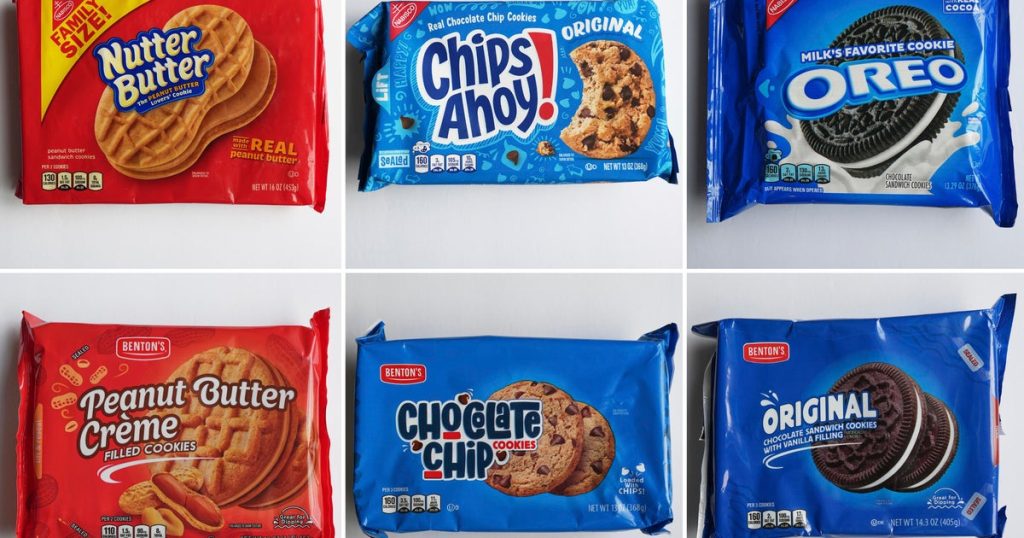Mondelez International, the renowned producer of popular snack brands like Oreo and Wheat Thins, has taken legal action against Aldi, a prominent supermarket chain, over allegations of trademark infringement. This federal lawsuit was filed in Illinois and accuses Aldi of intentionally mimicking the distinctive packaging of Mondelez’s products, potentially misleading customers into believing they are purchasing genuine Mondelez items rather than Aldi’s store-brand alternatives. Mondelez is seeking both monetary damages and a court order to prevent Aldi from selling the allegedly infringing products.
| Article Subheadings |
|---|
| 1) Allegations of Packaging Similarity |
| 2) Specific Products Under Scrutiny |
| 3) Legal Precedents and Background |
| 4) Corporate Profiles of Mondelez and Aldi |
| 5) Implications for Future Retail Practices |
Allegations of Packaging Similarity
In the lawsuit filed in Illinois, Mondelez International accuses Aldi of deliberately copying the unique packaging elements that define its snack products. This purported infringement is said to be a strategy by Aldi to confuse consumers and persuade them to purchase its store-brand offerings instead of the well-established Mondelez brands. According to the complaint, Aldi’s actions go beyond mere brand competition, as they engage in behavior that could mislead everyday shoppers. Mondelez emphasizes that such a tactic undermines consumer trust and fair market competition, which are vital in the retail landscape.
Specific Products Under Scrutiny
Mondelez has pointed out several specific products from Aldi that it alleges closely resemble its own. Among these items are Aldi’s Peanut Butter Creme Filled Cookies, which are packaged in a red box akin to the famous Nutter Butter cookies by Mondelez. The lawsuit highlights that the font, color schemes, and layout of the product image are suspiciously similar to those of the original, designed to deceive consumers. Another prime example is Aldi’s Thin Wheat, which Mondelez states bears an almost identical design to Nabisco’s Wheat Thins, featuring similar colors and product descriptions. Such instances highlight why Mondelez feels compelled to take legal action, as it feels that Aldi’s actions are not coincidental but rather strategically coordinated to mislead customers.
Legal Precedents and Background
This legal battle is not an isolated incident for Aldi, which has faced accusations in the past regarding its packaging strategies. Earlier this year, a U.K. appeals court ruled in favor of Thatchers, a cider company, in a trademark dispute concerning design similarities in packaging. Such legal precedents underline a growing concern in the food industry regarding packaging that can confuse consumers. The outcome of Mondelez’s lawsuit against Aldi could set significant boundaries for how branding and packaging strategies can be formulated in retail, reinforcing the importance of unique brand identities.
Corporate Profiles of Mondelez and Aldi
Mondelez International stands as one of the largest multinational food companies globally, operating in over 150 countries with a portfolio featuring globally recognized brands. Its strong market footprint and commitment to brand integrity make it a formidable player in the snack industry. Conversely, Aldi, founded in Germany and now operating over 6,600 stores across more than 10 countries, positions itself as a discount supermarket chain, known for its store-brand products that attract price-sensitive consumers. The juxtaposition of these two companies illustrates the tension between established brands and emerging competitive strategies in retail.
Implications for Future Retail Practices
The outcome of this legal case may have far-reaching implications for the entire retail sector. Should Mondelez win the lawsuit, other companies may be encouraged to follow suit against similar packaging practices across various sectors. As retail strategies evolve and consumers increasingly seek affordability, the line between competitive pricing and misleading packaging could become a contentious issue. The case shines a light on the legal standards surrounding branding, particularly in the grocery sector where consumer trust plays a crucial role in purchasing decisions.
| No. | Key Points |
|---|---|
| 1 | Mondelez International has filed a lawsuit against Aldi for allegedly copying its packaging designs. |
| 2 | The lawsuit seeks monetary damages and seeks to prevent Aldi from selling the infringing products. |
| 3 | Similarities in packaging include font, color, and design elements that may mislead consumers. |
| 4 | The outcome could set precedents for how brand packaging is regulated in retail environments. |
| 5 | Both companies have significant market footprints, with Mondelez operating in over 150 countries. |
Summary
In conclusion, the legal clash between Mondelez International and Aldi signals a critical moment in the retail sector focused on branding ethics and consumer trust. This case may pave the way for stricter regulations on packaging and marketing strategies in the food industry, influencing how corporations operate in a marketplace that is increasingly competitive yet burgeoning with consumer skepticism. As this lawsuit develops, its implications could resonate beyond just these companies, affecting wider industry practices and consumer rights moving forward.
Frequently Asked Questions
Question: What are the main accusations against Aldi?
Aldi is accused of copying the distinctive packaging of Mondelez products to mislead consumers into thinking that they are purchasing name-brand items when they are not.
Question: What legal actions is Mondelez pursuing?
Mondelez is seeking monetary damages and a court order to stop Aldi from selling the products that allegedly infringe on its trademarks.
Question: How has Aldi previously responded to similar allegations?
Aldi has faced similar legal challenges in the past, including a ruling in favor of a cider company regarding packaging design similarities, showcasing a pattern in these disputes.


